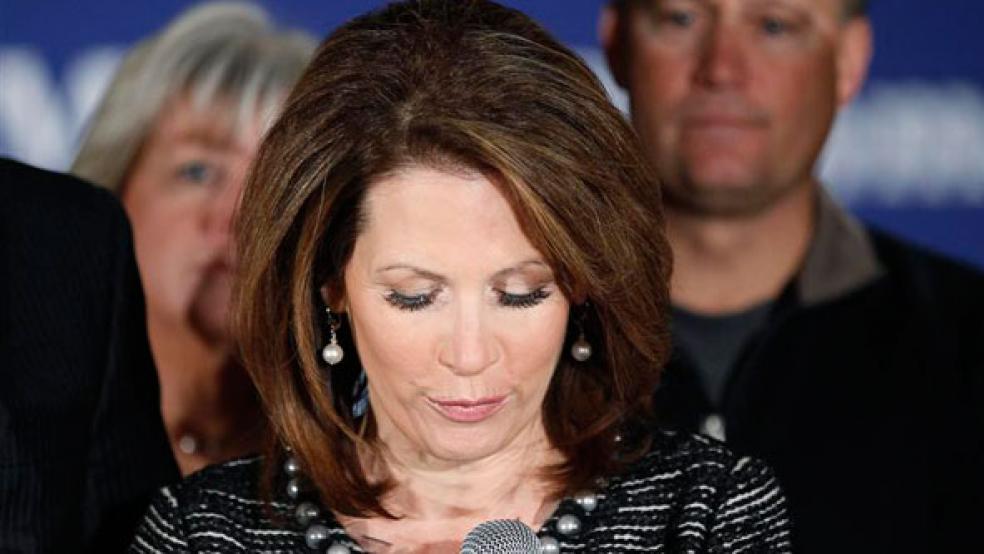With Michele Bachmann now out of the presidential race after a dismal showing in the Iowa GOP caucuses, and Gov. Rick Perry of Texas retreating to Texas to reassess his prospects, history is repeating itself:
Perry has indicated he will make another roll of the political dice in South Carolina, but it’s far from certain he can survive after his 10 percent, fifth-place showing in Iowa, behind Mitt Romney, Rick Santorum, and Ron Paul. In a campaign tweet, an upbeat sounding Perry said, “And the next leg of the marathon is the Palmetto State... Here we come South Carolina!!!” It was posted with a photo of Perry jogging in Texas and making a thumbs-up gesture.
Gingrich finished fourth with 13 percent, and has pressed on to New Hampshire, where he has vowed to bring Romney down for “lying” and distorting his record in a flood of attack ads. New Hampshire and South Carolina will likely be his last chances to rekindle a campaign that crashed and burned last summer, but was resurrected thanks to Gingrich’s strong debate performances this fall. He then plummeted in the past several weeks.
Bachmann, 55, a champion of the Tea Party on Capitol Hill and one of the shrillest critics of President Obama’s health care law, briefly soared to the head of the pack last summer after winning an Iowa Republican straw poll, but then dropped after a series of campaign missteps and dubious statements.
After the Iowa native drew a mere five percent of the Iowa GOP caucus vote, she told supporters on Wednesday morning, “The people of Iowa spoke with a very clear voice, and so I have decided to stand aside.”
Bachmann had operated on the fringes of Republican presidential politics as campaign season was heating up last spring, and was better known for her role as the aggressive founder and leader of the House Tea Party Caucus than as a viable White House contender.
Nevertheless, her strong performance in the first major GOP debate in June helped catapult her into the mainstream, with publications including The Hill, The Washington Post, and The National Journal labeling her performance as impressive, and her Iowa GOP voter support rising to 22 percent in late June, according to a Des Moines Register poll.
But Bachmann was unable to sustain her lead for long. Despite winning the Iowa straw poll in early August, her campaign firepower began to dissipate that same day with the entrance of Perry. Perhaps even more damaging was the break-up of her campaign staff in September following internal squabbles.
Perry bounded on to the scene in August, and immediately began touting his pro-business, anti-regulation agenda, weaving in references to his strong Christian faith, which attracted evangelicals. But he foundered after several stumbling debate performances, at times forgetting his train of thought, or otherwise remaining almost silent.
In a bid to get his campaign back on track, the Texas governor announced at a debate in Michigan in November that he planned to eliminate three government agencies in Washington. But as he began to explain, he could think of only two of the three. Pressed for the name of the third department, a sheepish Perry finally said, “I can’t. The third one, I can’t. Sorry. Oops.”
He was also hammered over his immigration policies and for ordering young girls to be vaccinated against a sexually transmitted virus.
Bachmann attacked Perry during a GOP debate in September supporting the distribution of the vaccine to girl before they are sexually active The vaccine prevents human papillomavirus (HPV) which can cause cervical cancer later in life. Bachmann ignited controversy immediately after the debate when she called the HPV vaccine “potentially a very dangerous drug,” and recounted a story of a mother who claimed that her daughter had become mentally retarded because of the vaccine’s after-effects.
In a subsequent debate, Bachmann was asked: “Do you stand by your statement that the HPV vaccine is potentially dangerous, and if not, should you be more careful when you’re talking about a public health issue?” Bachmann immediately denied that she had made that claim, and never attempted to identify the mother or acknowledge that it was a mistake to relay unverified information.
A series of geography and history blunders over the course of the fall and winter months left foreign policy experts and voters questioning whether Bachmann had the smarts to be in the White House.
First, Bachmann suggested in an October foreign policy debate that Libya was not located in Africa. She bashed President Obama for “putting us in Libya,” but continued on to say, “He is now putting us in Africa. We already were stretched too thin, and he put our special operations forces in Africa.”
Also, last spring she famously confused Massachusetts and New Hampshire in front of a New Hampshire crowd. “What I love about New Hampshire and what we have in common is our extreme love for liberty. You’re the state where the shot was heard around the world in Lexington and Concord.” The battles of Lexington and Concord took place in Massachusetts in 1775.
This December, she made another foreign policy gaffe, telling Iowa supporters that one of her top foreign policy priorities would be close the U.S. embassy in Iran – which does not exist. The U.S. has not operated an embassy in Iran since 1980, when the U.S. cut diplomatic ties with the country.






